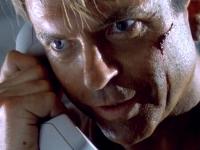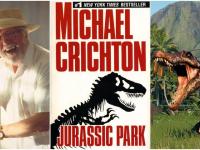Why Jurassic World Is More Successful Than Jurassic Park At The Box Office

As popular as the Jurassic Park trilogy was, the Jurassic World movies have proven more successful at the box office. Here's the reason why.
As popular as the Jurassic Park trilogy was, the Jurassic World movies have proven more successful at the box office. 18 years after he invented the summer blockbuster with Jaws, Steven Spielberg changed the game again with his classic tale of mankind's arrogance in the face of the powers of creation and mother nature. The original Jurassic Park would go on to become the highest-grossing film ever upon its initial release in 1993, and continues to break records to this day, even topping the box office 27 years later thanks to theaters showing it and other classic movies in lieu of new releases due to the ongoing COVID-19 pandemic.
Spielberg's movie was so beloved, it's since given rise to a pair of direct followups, in addition to the Jurassic World sequel trilogy, which kicked off in 2015. Directed by Colin Trevorrow, the first Jurassic World picks up from the Jurassic Park films in real-time, and fulfills the late John Hammond's vision of a fully operational - and highly profitable - dinosaur theme park. However, when corporate greed and hubris prompt the park's owners and scientists to create a hybrid dinosaur in an effort to boost attendance, it goes terribly wrong and sets in motion a chain of events that will forever change life as people know it.
The trilogy will conclude with the upcoming Jurassic World: Dominion, a sequel that moves the story from an island to a global setting after the second film in the series, 2018's Fallen Kingdom, ended with the surviving dinosaurs of Isla Nublar escaping into the world. Despite the mixed response to the first two Jurassic World movies, anticipation is high for Dominion thanks to a combination of its setup and the return of Jurassic Park legacy actors Sam Neill, Laura Dern, and Jeff Goldblum. As such, the film is expected to perform nearly as strongly at the box office as its predecessors, thusly cementing Jurassic World as the bigger of the two Jurassic trilogies, commercially-speaking.
Jurassic World Is A Bigger Franchise Than Jurassic Park

Not adjusting for inflation, the three Jurassic Park movies (Jurassic Park, The Lost World: Jurassic Park, and Jurassic Park III) have grossed just over $2 billion at the global box office, as opposed to the $2.97 billion taken in between Jurassic World and Fallen Kingdom alone. Even if Dominion suffers a significant drop-off from the previous films in the trilogy, it should still bring in somewhere in the vicinity of $900 million to $1 billion, putting the trilogy at a cumulative gross in the region of $4 billion.
Of course, when you adjust for inflation, Jurassic Park is easily the single biggest movie in the entire Jurassic franchise, with a domestic gross of $837 million (as opposed to $705 million for Jurassic World). The Lost World's U.S. box office returns are similarly bigger than Fallen Kingdom's when adjusted ($455 million vs. $418 million), though the latter may still be the higher-grossing one thanks to its massive international haul. But even after taking that into account, the Jurassic World trilogy is still on-course to outperform the Jurassic Park series thanks to their respective third installments.
Jurassic Park's Sequels Hurt The Franchise

Unlike Jurassic Park, The Lost World was a critical disappointment and didn't perform near as well worldwide, taking in $619 million or nearly a third less than Jurassic Park during its original theatrical run four years earlier. In fairness, that wasn't unexpected; up to that point, even well-received sequels to box office smash-hits typically grossed noticeably less than their predecessor, like what happened with The Empire Strikes Back and Star Wars. However, whereas Return of the Jedi would go on to outgross The Empire Strikes Back, Jurassic Park III took in significantly less than The Lost World ($369 million) when it arrived in 2001, no doubt due to the latter's middling reception, combined with the movie's own lackluster critical response.
While The Lost World and Jurassic Park III both have their fans, the sequels are (arguably) fairly forgettable compared to the first Jurassic Park: they struggle to continue the film's story in a compelling manner, their human characters are generally less memorable than those from the first movie, and even their special effects sometimes fall short of the bar set by the original film, despite having Spielberg and fellow VFX guru Joe Johnston at the helm. Jurassic Park IV (which would become Jurassic World) was actually put into development before Jurassic Park III came out, but by that point the brand had already been damaged, so it's little wonder the sequel fell into development limbo for as long as it did.
Jurassic World Benefits From Nostalgia - And An Era Of Franchise Rule

By the time Jurassic World started to move forward with pre-production in 2013, the movie landscape was much changed from when Jurassic Park III had come out. Obviously, while franchises were already a thing when the Jurassic Park trilogy began in the 1990s, they weren't the draw they were in the wake of the Marvel Cinematic Universe's success with The Avengers in 2012 and the subsequent rise of shared universes across Hollywood. Even before that happened, long-running properties like Fast & Furious and Mission: Impossible had recently started to enjoy newfound levels of commercial success, so the way had already been cleared for the Jurassic franchise to make a triumphant return.
Jurassic World opened the same year as the first of Disney's Star Wars sequels, The Force Awakens, and each of them was able to successfully utilize nostalgia for their respective properties. Much like the divisive Star Wars prequel trilogy had either faded from audiences' memories or been re-evaluated by many die-hard fans when The Force Awakens premiered, nostalgia for Jurassic Park was glowing again when Jurassic World arrived thanks to people having either forgotten the previous sequels or developed a more favorable outlook towards them over time. More than that, both films were able to use the legacy-quel formula to tap into that nostalgia and better remind everyone what they loved about these franchises (while also playing down the not-so-beloved parts).
Is Jurassic World A Better Franchise Than Jurassic Park?

In terms of quality, one would probably have to give the Jurassic Park trilogy the advantage over the Jurassic World movies. Admittedly, comparing them is a tricky task; the first two Jurassic World films have their highs (strong action sequences, intriguing sci-fi concepts) and lows (the sexism in Jurassic World, Fallen Kingdom's derivative story elements), but fall somewhere in the middle in terms of the overall franchise. Things are more skewed with the Jurassic Park trilogy since the first movie is so much better than anything else in the whole series, yet Jurassic Park III is considered by many to be the property's low point and The Lost World is somewhere in the same realm as the Jurassic World films.
To be fair, the outlook could change after Dominion is released. If the sequel manages to both deliver on the potential of last year's Battle at Big Rock - a short film helmed by Trevorrow and set between Fallen Kingdom and Dominion - and fulfill the promise Trevorrow showed with his unmade script for Star Wars 9, then Jurassic World may end up being the better trilogy based on the averages of all three movies. Even then, though, there's no topping the original Jurassic Park as a creative accomplishment (much less for its sheer cultural impact), so it's probably safe to call the game early in that regard.
Source: https://screenrant.com/








